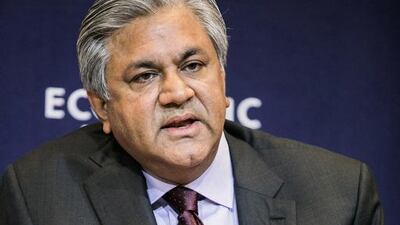DEAD SEA // The best way for governments of countries in transition to attract inward investment is to create a robust enabling environment and then “get out of the way”, according to the Abraaj Group chief executive Arif Naqvi.
Speaking at a debate on models for investment for countries in transition at the World Economic Forum on the Middle East and North Africa at the Dead Sea, Jordan, on Saturday, Mr Naqvi said “governments in the 21st century should be in the business of government, not management”.
“In our world, in Mena, government is a regulator, a manager, an investor and it is the law-giver. Some of those have to give way because otherwise 80 per cent of the workforce in this region will continue to be employed by government and it is not going to lead to development.”
Dubai’s Abraaj Group has been an active investor in what Mr Naqvi calls “global growth markets” (he believes the term “emerging markets” is a misnomer) since 2002, and he feels potential backers of projects “are not being very innovative” in the way that they assess risk.
“If you look at the last decade or so, where did risk come from in the global financial landscape? Risk came from the heart of Wall Street.
“In today’s world, the biggest political risk came from Brexit. The next political risk came from the election in the United States. So there is a little bit of a misperception going on.”
He said one recent study of 5,000 global infrastructure projects found that schemes in Africa had a failure rate of just 1 per cent, but those in North America had a 9 per cent failure rate.
David Walker, the head of public sector markets at Citigroup, said governments do have a role to play in transition economies and are often dominant because there is “less strength in depth” in other institutions. However, he said this role should be limited to “advocacy and enabling power” and it should know when to step out of the way of the private sector. He said there are opportunities in transitional economies, as it gives firms “a chance to go where others are not going at the moment”.
Yet Abeer Odeh, the minister for the national economy for the Palestinian Authority, said in some transition economies such as Palestine, the government needs to play a greater part.
“I can’t say that we are a country in transition because we don’t know when the occupation will end,” said Ms Odeh.
She said the government’s role is to provide necessary legal framework, but also to help to attract investors and, where necessary, to provide them with incentives.
“In our case, we rely on donors. In Bethlehem Industrial Zone, we can provide them with a grant from the French government – up to 50 per cent of the cost of equipment. Same case in Jericho Industrial Zone – the Japanese government is providing up to 50 per cent of the cost of the whole project,” she said.
She also said work needs to be done to persuade investors that, despite the impression of turmoil given as a result of media reporting, there is “high potential [and] there are success stories that need to be presented to the whole world”.
Mr Naqvi said “the most important aspect is local understanding”.
He said Abraaj Group has invested in more than 200 companies across various markets over the past 16 years.
“Over this period, our loss ratio is under 2 per cent. In markets that the world considers risky, if you don’t lose capital there must be something you are doing right.”
mfahy@thenational.ae
Follow The National's Business section on Twitter


